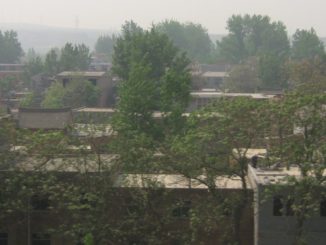
Steve Cadman from London, U.K., CC BY-SA 2.0, via Wikimedia Commons
Just before 2000, I decided to give up a well-paid job and comfortable life in Japan to make a new start — please don’t laugh — in my homeland. England. Get back to my roots. I had bought a share in a house in south London, and thought I would be able to bring my years of experience in journalism and financial translation lucratively to bear in the City.
Well, that turned out to be a mistake. The City was not interested in Joe Slater’s portfolio of talents. After nine months of more or less unbroken idleness, I hit the temporary agencies, and so, for the year-end 2000-2001, became a London postman.
I was going to call these articles Chronicles of Crap Jobs, but I couldn’t resist the obvious title. Besides, although being a temp postie certainly was a crap job, it was also an enjoyable crap job. That was entirely down to the walking, which accounted for more than half of the paid time. I love walking, in all weathers, and I like the early morning. It was also truly healthy – when did you last see a fat postman? But the rest was indeed crap.
They sent me first to Lewisham post office, which, I was gravely informed the morning I arrived, was “in crisis.” I never really found out what that meant exactly, but merely having to deal with a place like Lewisham on a daily basis would probably send most organisations over the edge. I do not wish to imply that Lewisham is in any way an undesirable address, but a friend of a friend, a dotty, middle-aged, unmarried vicar’s daughter who went on SWP demos, managed to get mugged seven times in seven years there. Seven times. While I was working there, a bus-stop stabbing murder took place outside the police station. The cops had put out a sign saying “Witnesses wanted” about ten feet from their own ground-floor windows. Which, of course, were panelled over to prevent vandalism. That was Lewisham. And it wasn’t the shittiest place I had to deliver to in those weeks.
Here, and in neighbouring and much nicer Blackheath, I found my feet as a postman. The hard bit was not delivery, but sorting. This was a skill. Sacks of mail would be brought into the office at some dawny hour, and you, still half-asleep, would have to sort them into a wooden ledger, with one slot per street. Each street’s mail was then bundled. I don’t know what the shortcuts and tricks were with this job, but the veterans could do it twice as fast as the temps, and so got out onto the beat an hour earlier, leaving us temps alone in the office with the airheads of morning TV blathering loudly away on the canteen telly.
But sorting was the one place where you had some sort of communion with your colleagues. From them, I learnt that 37% of the Royal Mail’s earnings come from junk mail (“business mail, we call it”) and that one item of “business mail” could create up to 10 or so others through catalogue orders, purchases, payments, and other customer follow-up. But mostly people just threw “business mail” in the bin. Yes, I said, that’s exactly what I do. Well, one said, it’s disheartening when you’re working in the pissing rain to see a customer stand before your very eyes and tear up something you just delivered. I supposed it was.
The Lewisham lads were so cheesed off, in fact, that in these weeks they were sporadically on strike — overtime ban on this occasion — which is why I was getting the work. They were having mixed results with us “casuals.” One lad with a three-hour round was out until a quarter to seven in the evening one day. A Congolese man the agency sent had no English. “Couldn’t even bloody read the addresses. Never mind find them. Why does your agency send us these wastes of space?”
Thus my disgruntled supervisor, who sat in a corner all morning taking calls from disgruntled “customers” as the post office called the locals it delivered to. I didn’t envy him. He got people moaning that letters had not been properly “shoved right in.” A delicate point. “Our contract obligation ends at the door,” he said darkly. “If the customer’s letter box is too small, that’s not our problem.”
My first round took about five hours, and I was last back to base with an empty sack. And a sore shoulder, for a full mail bag is quite a weight. It was a “good” round, neatly terraced streets, doors all in the same place, no awkward blocks of flats with entry buzzers and staircases. Round two was in Blackheath, which the regulars disliked because it had so much “dead ground.” Dead ground was stretches of pavement between houses, and these could be vast in Blackheath, where many properties were villas standing in spacious gardens. It took twice as long to deliver ten letters here than in Lewisham. Here, within fifteen minutes’ walk of mugging scenes in Lewisham High, you could find old coach houses and coach-lamps. But these places were a pain. In addition to the walking, there would often be flats at the back or in the basement, which could take some finding. You could easily spend five minutes pottering about the shrubbery of a single property in Blackheath looking for obscure doors. That mounts up. Another thing about Blackheath was that many of the houses were built in a time when letter boxes were much smaller than they are today, so you would lose more time trying to bundle an A4 envelope through a B5 slot, often with a dog barking and leaping about frantically trying to tear it out of your hand.
Then I was reassigned back to Lewisham. I slowly got more skilled at the sorting, and less patient with some of the people you had to deal with on the beat. “Can’t you read?” snapped a woman at 55 Aberdare Crescent, who had received a letter for 58 (5 and 8 were often hard to distinguish when handwritten). “Can’t your correspondents write?” I snapped back, stupidly. “It’s not MY correspondent, is it, you twit, it’s 58s’.” One-nil to Mrs. X of Aberdare Crescent.
* * *
You could wear what you liked as a Royal Mail postie. Shirt-tails hanging out were almost part of the uniform. You could do the round in a Mao tunic, or in drag, or dressed as Ronald McDonald, for all the bosses cared. But woe betide anybody who broke ranks with the union.
Mail delivery was like piece work — the faster you finished, the earlier you went home. So there were real incentives for working more efficiently. The union hated that. Posters at the delivery centre warned against “starting early,” “loading up with two heavy bags” (instead of the usual one; taking two was faster) and “skipping proper meal breaks,” all of which sins could result in an early finish. Getting the job done more efficiently was exactly what the postal union wanted to avoid, because that would make it more attractive for a private-sector takeover. You probably think I am joking or exaggerating here. But those posters existed. “We stopped privatisation once,” one said, but “now we’re killing the job ourselves” by being too keen and efficient. “This must stop.”
I got sent out on a big, six-hour round, near Deptford. A long session in the sorting office, listening to the morning news show rubbishing on about a recent downpour and urging viewers to share their global-warming misery via Channel 4’s “Storm Agony Line.” Then off into the December drizzle.
It was a shabby immigrant area, the usual run-down Victorian terraces with mattresses and dead fridges in paved-over front gardens, and gates hanging off their hinges. Some of the basement areas were disgusting, and some of the mail slots emitted exotic but stale savours of far-flung former colonies when you lifted the cover. Every single property I did could have used a fresh coat of paint.
My bag this day was 19.6 kg, 3.6 kg over the limit — union rules did not apply to temps. A lot of it was glossy junk mail — car insurance offers, mobile phone discounts, that sort of thing — that was disproportionately heavy and slowed you down. It also pissed off the punters. A lady opened the door immediately after receiving some Reader’s Digest blurb and stood there waving it angrily. She said she had been diddled over a luxury teapot offer in a previous Digest brochure, and seemed to think that was the postman’s fault. Postmen often copped the flak for bad news in the mail.
The following day, a brief but pleasant return to the villas of Blackheath, in bright, crisp sunlight. Arriving early, I passed Charlton House, a more or less intact brick Jacobean mansion and park standing incongruously amid the semis of southeast London. It was just before dawn, and the streets were quiet. From below the horizon, the unseen sun lit up the jet-trails of planes converging on, I guess, London Airport. With about a dozen translucent trails slicing the clear sky above the mansion, it looked like a meteor shower, and for a few moments I forgot entirely that I was standing outside a Somerfield in a dismal litter-strewn London street with a sack of junk mail pulling one shoulder three inches below the other. This job, I thought, could be worse.
© Joe Slater 2024



